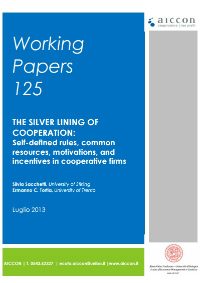125 – The Silver Lining Of Cooperation
Abstract
Cooperatives are characterised by mutual-benefit coordination mechanisms aimed at the fulfilment of members’ participation rights. This paper explores the institutional elements that regulate individual behaviour and outcomes in cooperatives by bringing together new-institutionalism, behavioural and evolutionary economics.
Our framework considers four main dimensions of the governance of cooperative firms: (1) the development and application of self-defined rules by the members of the cooperative; (2) the management, and appropriation of common resources and outcomes; (3) intrinsic motivations and reciprocating behaviours; (4) the implementation of suitable incentive mixes based on inclusion and reciprocity, including both pecuniary and non-pecuniary elements.
An example is offered in order to highlight possible problems in the governance of cooperative firms, in particular the processes of distribution and appropriation of surplus. The example aims at introducing the discussion of the new framework of analysis.
JEL Classification: L21, L23, L26
Keywords: cooperative firms, common resources, motivations, incentives

